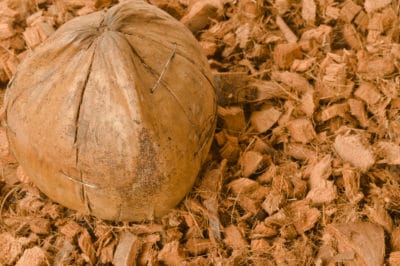What is Coconut Mulch?
When it comes to organic mulches, coconut mulch or coconut coir is a relative newcomer on the market to home gardeners, though commercial greenhouses have been using the product for over a decade. It is a natural waste product produced from the outer shell or husk of coconuts.
During processing, the husks are shredded, cleaned, sorted, graded and finally packaged for use. Depending on the product and manufacturer, you can purchase chipped coconut mulch or types that are more shredded. You can most likely locate it at your local garden center.
Additional Uses
In addition, there are coconut coir disks used for container gardening that reduce weeds and helps the potting mix retain water. You simply slip the slit around the plant stem and the disk lays flat on top of the soil. The coir also comes in large mats which lay flat upon the ground and are useful in areas where erosion in a problem.
Coconut coir has a wealth of uses, besides those in the garden and include, the manufacturing of brushes, stuffing for upholstery, ropes and doormats. Besides its use as an organic mulch, it’s also used as a soil amendment and ingredient used in potting mixes.
Advantages of Using Coconut Mulch
Gardeners have a variety of advantages by using coconut mulch in their gardens over many of the other types of mulches on the market. Unlike cypress mulch, where entire stands of trees are killed for the sole purpose of making mulch, coconut mulch is an environmentally friendlier alternative because you are utilizing an otherwise waste product from harvested coconuts. Best of all, no trees are killed in the process. Some advantages include:
- Used like regular mulch for weed-control
- Has a relatively neutral to slightly acidic pH of 5.5 to 6.8.
- Retains seven times its weight in moisture, which helps the soil retain moisture.
- Coconut mulch doesn’t pack down, which allows for good air penetration.
- The mulch doesn’t need replacing as frequently as other types of mulch and can last up to three years.
- Coconut husk mulch is from a renewable resource, is easy to use, weed-free and completely biodegradable.
Tips for Using
The major difference in coconut mulch compared to other organic mulches, when it comes to its use, is you need to soak it before using. It’s recommended to soak the mulch anywhere from 30 minutes to overnight before applying. The product can expand up to five times its size before soaking, so be sure to use a container that is large enough like a garbage can, wheelbarrow or child’s plastic pool.
Once the coconut mulch has soaked and increased to its full-size, you simply apply as you would any other mulch. Using a thickness of 3 to 4 inches helps control weeds. To prevent disease, keep the product from butting against the trunks of plants by pulling it back several inches.
